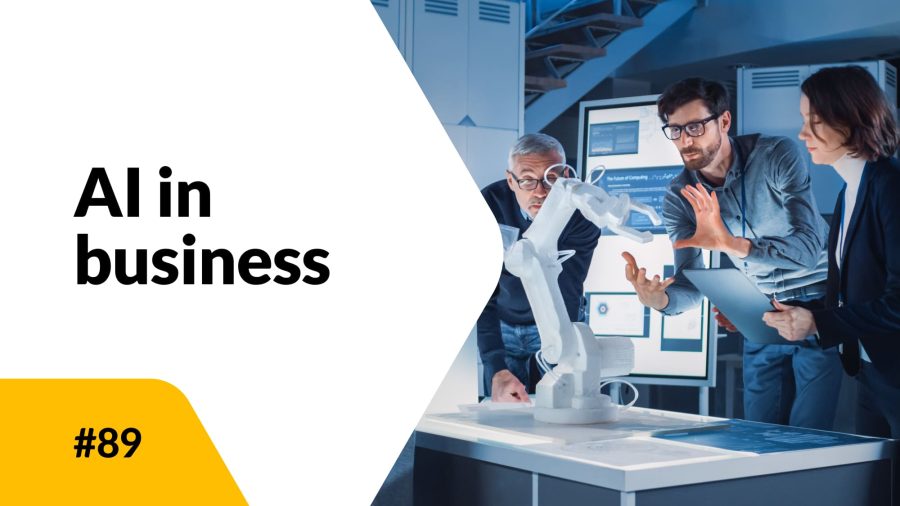AI in logistics - table of contents
AI in logistics. How to improve the delivery system using artificial intelligence?
The logistics sector is undergoing transformation. According to forecasts by Allied Market Research, the value of this industry will reach 13 trillion dollars by 2027. It is AI that provides real-time alerts about operational issues, allowing companies to react promptly and ensure timely deliveries.
Thanks to AI algorithms, it is possible to ensure data accuracy for decision-making and predict inventory needs to avoid shortages of popular products. AI also identifies the cheapest and most efficient delivery routes, resulting in cost savings. Here are a few key ways in which AI impacts the logistics sector:
- Resource management – AI enhances operational efficiency. For example, AI systems analyze fuel consumption and driver working hours to optimize schedules and delivery routes.
- Evolution and learning from trends – thanks to AI, companies automate processes and stay competitive. Algorithms learn from seasonal sales patterns to better forecast future demand.
- Parcel tracking – AI helps in monitoring deliveries to ensure they are on time. AI-based tracking systems notify the company about potential delays in transportation.
- Supply chain transparency – AI enables quick issue resolution. AI dashboards allow real-time identification and resolution of bottlenecks in the supply chain.
- Data management – AI ensures accuracy and consistency of data. AI systems monitor and update product data in real time, ensuring its accuracy throughout the supply chain.
AI in logistics. Best tools
The development of AI technology in logistics has opened up new possibilities for companies to improve supply chain management. Let’s take a look at the most advanced tools that assist in achieving these goals.
IBM Watson Supply Chain
IBM Watson Supply Chain is a tool that, through AI, provides organizations with real-time insights, predictive tips, and recommendations for action. This enables inventory management optimization, demand forecasting, and supplier relationships through the analysis of data from various sources. IBM Watson Supply Chain Insights is an AI-based solution that:
- increases supply chain visibility,
- provides insights, allowing better data management and practical guidance.
This allows for more effective mitigation of disruptions and risks, as well as improvement in decision-making and performance across the entire supply chain.
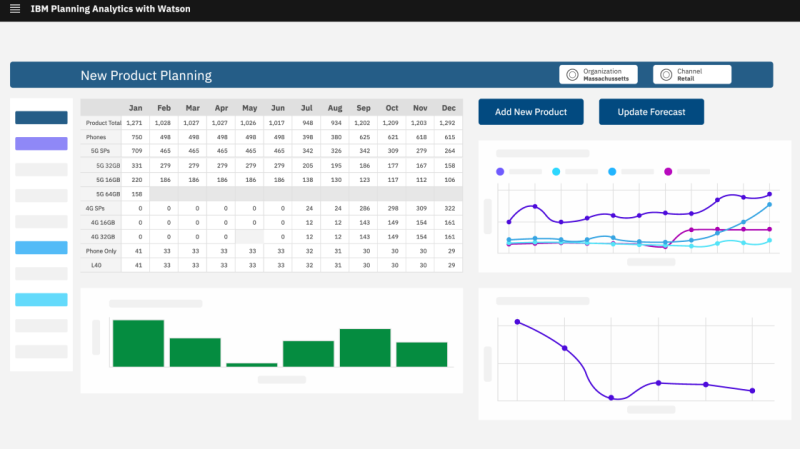
Source: IBM (https://www.ibm.com/products/planning-analytics/supply-chain-planning)
SAP Ariba
SAP Ariba is a cloud-based platform for procurement and supply chain management that leverages AI to streamline the processes of sourcing goods, managing suppliers, and negotiating contracts. Its AI-supported analytical engine helps companies identify potential risks and opportunities to enhance efficiency and safety in their supply chain.
AI in logistics applied by SAP Ariba is a procurement and expense management service that allows suppliers and buyers to connect and conduct business on one platform. It provides a comprehensive set of solutions for managing the entire procurement process and building ethical and ecological supply chains.
The biggest advantage of SAP Ariba is the ability to seamlessly integrate with other SAP tools to ensure comprehensive business support in terms of digital services and expertise. This results in reducing financial and operational disruptions and lowering the risk associated with suppliers. The Ariba Network is a key component of SAP Ariba, powered by SAP HANA, providing a platform for managing catalogs, offers, purchases, and invoices.
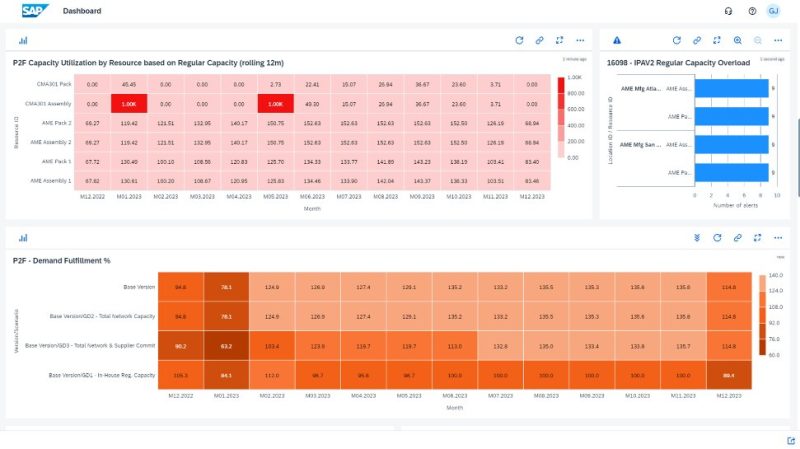
Source: SAP (https://www.sap.com/poland/products/spend-management/ariba-login.html)
o9 Solutions
o9 Solutions offers an Integrated Business Planning (IBP) platform supported by AI that helps organizations align processes from three main areas of the company:
- supply chain,
- sales department, and
- finance area.
Advanced demand forecasting capabilities enable companies to optimize inventory levels, reduce order fulfillment time, and enhance customer satisfaction. o9 Solutions is an AI-supported planning and decision-making platform that enables true Integrated Business Planning (IBP) for global companies. It offers a suite of solutions for supply chain planning and analysis, retail planning, and production scheduling.
The o9 Control Tower dashboard enables quick and informed decision-making based on data. The o9 Solutions platform, offering AI solutions in logistics, helps companies manage complex processes by integrating best practices and enabling data-driven strategic business planning.
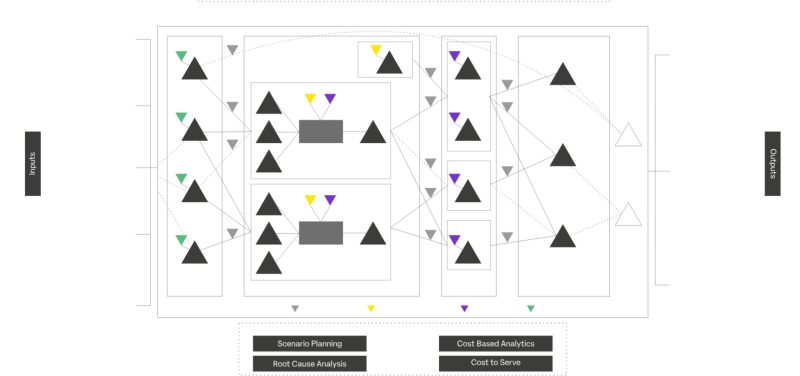
Source: o9 Solutions (https://o9solutions.com/solutions/supply-chain/)
FourKites
FourKites is a real-time supply chain monitoring platform that utilizes AI and machine learning to predict the arrival times of shipments and optimize transportation routes. As a result, companies can reduce transportation costs, increase customer satisfaction, and minimize the environmental impact of logistics operations.
One of FourKites’ clients, Henkel, benefits from using AI in logistics by having access to real-time data on the location and estimated time of arrival (ETA) of shipments. This allows them to better plan their tasks and respond to potential delays. FourKites has also brought other advantages to Henkel, such as time and cost savings, improved quality, fair dispute resolution, and avoiding penalties for delays. In 2023, Henkel planned to track nearly a million shipments using FourKites.
Oracle SCM
Oracle SCM is one of the most sophisticated AI tools in logistics. It provides a set of AI-supported supply chain management tools that enhance decision-making, optimize processes, and drive operational performance throughout the supply chain (Oracle Supply Chain Management (SCM)). Some of these tools include:
- Oracle Intelligent Track and Trace – meaning a tool for tracking the carrier’s route and the shipment’s path,
- Oracle Demand Management – a demand management tool that allows controlling inventory levels even in large enterprises,
- Oracle Supply Chain Planning – a module used for planning supply chains in the company,
- Oracle Transportation Management – a transport management platform,
- Oracle Warehouse Management – a tool for controlling warehouses and deliveries.
Oracle SCM (Supply Chain Management) is a comprehensive set of applications designed to manage the supply chain with increased efficiency and visibility. It includes a range of features, such as product lifecycle management, supply chain planning, procurement, logistics, and order management. An AI-powered logistics tool can also integrate with Internet of Things (IoT) devices and blockchain to meet modern supply chain challenges.
Oracle uses not only AI and ML (Machine Learning) in logistics, which accelerate data analysis, revealing issues related to employees and supply chain inefficiencies. Modern solutions collaborating with AI in logistics also include voice interfaces and Natural Language Processing (NLP), improving not only accessibility and speed but also data analysis and decision-making skills.
The most significant innovation, however, is predictive analytics. It allows comparing future sales orders with staffing levels to uncover skill gaps and identify needs related to warehouse volume or vehicle availability. All this is aimed at reducing disruptions in the supply chain.
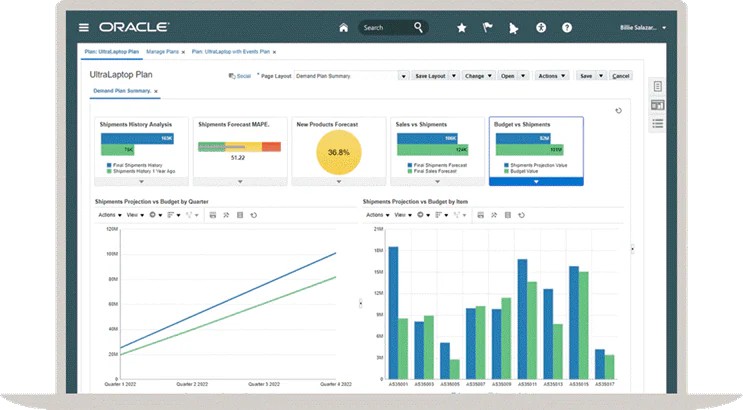
Source: Oracle (https://www.oracle.com/scm/product-tours/#supply-chain-planning)
What problems can arise when using AI in logistics?
Introducing AI into logistics comes with challenges. The initial transformation requires significant investments and digitalization of the enterprise. AI algorithms in logistics can be complex, which may initially make it difficult to understand the decisions proposed by newly implemented management systems.
Ensuring data security is also essential to protect operational integrity and customer trust. Additionally, AI systems trained on insufficient quality data can lead to erroneous decisions and algorithmic biases. Therefore, it is important to prioritize employee training and thorough data collection for optimizing transportation right from the start of implementing AI in logistics within a company.
The future of AI in logistics
AI transforms logistics, streamlining operations, reducing delivery costs, and providing companies with a strategic advantage. The capabilities of AI enable companies to increasingly:
- optimize supply chains – AI in logistics allows for more precise planning and resource management,
- plan routes – thanks to artificial intelligence, it’s possible to find the most efficient routes for transporting goods,
- gain a strategic advantage – companies using AI in logistics gain an advantage over the competition by continuously refining both delivery systems and management methods over time.
The outline of the future scenario with AI in logistics may look as follows: companies will increasingly rely on AI for demand forecasting, automation of warehouse processes, and optimization of delivery routes. The utilization of artificial intelligence in management, planning, and the creation of future strategies will also grow.
Summary
AI in logistics brings significant benefits but also poses challenges. Companies considering AI should approach implementations thoughtfully, seeking guidance from logistics AI experts to ensure both the advantages and effectiveness of the technology are maximized in a secure and controlled manner.

If you like our content, join our busy bees community on Facebook, Twitter, LinkedIn, Instagram, YouTube, Pinterest, TikTok.
Author: Robert Whitney
JavaScript expert and instructor who coaches IT departments. His main goal is to up-level team productivity by teaching others how to effectively cooperate while coding.
AI in business:
- Threats and opportunities of AI in business (part 1)
- Threats and opportunities of AI in business (part 2)
- AI applications in business - overview
- AI-assisted text chatbots
- Business NLP today and tomorrow
- The role of AI in business decision-making
- Scheduling social media posts. How can AI help?
- Automated social media posts
- New services and products operating with AI
- What are the weaknesses of my business idea? A brainstorming session with ChatGPT
- Using ChatGPT in business
- Synthetic actors. Top 3 AI video generators
- 3 useful AI graphic design tools. Generative AI in business
- 3 awesome AI writers you must try out today
- Exploring the power of AI in music creation
- Navigating new business opportunities with ChatGPT-4
- AI tools for the manager
- 6 awesome ChatGTP plugins that will make your life easier
- 3 grafików AI. Generatywna sztuczna inteligencja dla biznesu
- What is the future of AI according to McKinsey Global Institute?
- Artificial intelligence in business - Introduction
- What is NLP, or natural language processing in business
- Automatic document processing
- Google Translate vs DeepL. 5 applications of machine translation for business
- The operation and business applications of voicebots
- Virtual assistant technology, or how to talk to AI?
- What is Business Intelligence?
- Will artificial intelligence replace business analysts?
- How can artificial intelligence help with BPM?
- AI and social media – what do they say about us?
- Artificial intelligence in content management
- Creative AI of today and tomorrow
- Multimodal AI and its applications in business
- New interactions. How is AI changing the way we operate devices?
- RPA and APIs in a digital company
- The future job market and upcoming professions
- AI in EdTech. 3 examples of companies that used the potential of artificial intelligence
- Artificial intelligence and the environment. 3 AI solutions to help you build a sustainable business
- AI content detectors. Are they worth it?
- ChatGPT vs Bard vs Bing. Which AI chatbot is leading the race?
- Is chatbot AI a competitor to Google search?
- Effective ChatGPT Prompts for HR and Recruitment
- Prompt engineering. What does a prompt engineer do?
- AI Mockup generator. Top 4 tools
- AI and what else? Top technology trends for business in 2024
- AI and business ethics. Why you should invest in ethical solutions
- Meta AI. What should you know about Facebook and Instagram's AI-supported features?
- AI regulation. What do you need to know as an entrepreneur?
- 5 new uses of AI in business
- AI products and projects - how are they different from others?
- AI-assisted process automation. Where to start?
- How do you match an AI solution to a business problem?
- AI as an expert on your team
- AI team vs. division of roles
- How to choose a career field in AI?
- Is it always worth it to add artificial intelligence to the product development process?
- AI in HR: How recruitment automation affects HR and team development
- 6 most interesting AI tools in 2023
- 6 biggest business mishaps caused by AI
- What is the company's AI maturity analysis?
- AI for B2B personalization
- ChatGPT use cases. 18 examples of how to improve your business with ChatGPT in 2024
- Microlearning. A quick way to get new skills
- The most interesting AI implementations in companies in 2024
- What do artificial intelligence specialists do?
- What challenges does the AI project bring?
- Top 8 AI tools for business in 2024
- AI in CRM. What does AI change in CRM tools?
- The UE AI Act. How does Europe regulate the use of artificial intelligence
- Sora. How will realistic videos from OpenAI change business?
- Top 7 AI website builders
- No-code tools and AI innovations
- How much does using AI increase the productivity of your team?
- How to use ChatGTP for market research?
- How to broaden the reach of your AI marketing campaign?
- "We are all developers". How can citizen developers help your company?
- AI in transportation and logistics
- What business pain points can AI fix?
- Artificial intelligence in the media
- AI in banking and finance. Stripe, Monzo, and Grab
- AI in the travel industry
- How AI is fostering the birth of new technologies
- The revolution of AI in social media
- AI in e-commerce. Overview of global leaders
- Top 4 AI image creation tools
- Top 5 AI tools for data analysis
- AI strategy in your company - how to build it?
- Best AI courses – 6 awesome recommendations
- Optimizing social media listening with AI tools
- IoT + AI, or how to reduce energy costs in a company
- AI in logistics. 5 best tools
- GPT Store – an overview of the most interesting GPTs for business
- LLM, GPT, RAG... What do AI acronyms mean?
- AI robots – the future or present of business?
- What is the cost of implementing AI in a company?
- How can AI help in a freelancer’s career?
- Automating work and increasing productivity. A guide to AI for freelancers
- AI for startups – best tools
- Building a website with AI
- OpenAI, Midjourney, Anthropic, Hugging Face. Who is who in the world of AI?
- Eleven Labs and what else? The most promising AI startups
- Synthetic data and its importance for the development of your business
- Top AI search engines. Where to look for AI tools?
- Video AI. The latest AI video generators
- AI for managers. How AI can make your job easier
- What’s new in Google Gemini? Everything you need to know
- AI in Poland. Companies, meetings, and conferences
- AI calendar. How to optimize your time in a company?
- AI and the future of work. How to prepare your business for change?
- AI voice cloning for business. How to create personalized voice messages with AI?
- Fact-checking and AI hallucinations
- AI in recruitment – developing recruitment materials step-by-step
- Midjourney v6. Innovations in AI image generation
- AI in SMEs. How can SMEs compete with giants using AI?
- How is AI changing influencer marketing?
- Is AI really a threat to developers? Devin and Microsoft AutoDev
- AI chatbots for e-commerce. Case studies
- Best AI chatbots for ecommerce. Platforms
- How to stay on top of what's going on in the AI world?
- Taming AI. How to take the first steps to apply AI in your business?
- Perplexity, Bing Copilot, or You.com? Comparing AI search engines
- ReALM. A groundbreaking language model from Apple?
- AI experts in Poland
- Google Genie — a generative AI model that creates fully interactive worlds from images
- Automation or augmentation? Two approaches to AI in a company
- LLMOps, or how to effectively manage language models in an organization
- AI video generation. New horizons in video content production for businesses
- Best AI transcription tools. How to transform long recordings into concise summaries?
- Sentiment analysis with AI. How does it help drive change in business?
- The role of AI in content moderation
